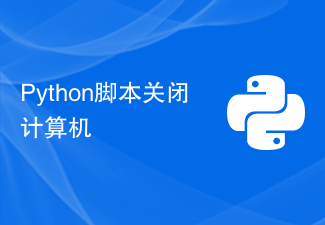
Can Golang replace traditional scripting languages?
With the continuous development of information technology, programming languages are also emerging. Each programming language has its own advantages and applicable scenarios. Traditional scripting languages such as Python and Bash have been widely used in various application scenarios. However, with the rise of Golang, some people began to think, can Golang replace traditional scripting languages? This article will discuss several aspects and give specific code examples.
1. Performance comparison
Most traditional scripting languages are interpreted languages, which usually require a layer of interpreter to run the code, which will cause some loss in performance. In contrast, Golang is a compiled language that is compiled into machine code and run directly, so it has certain advantages in performance. Let's take a look at the performance comparison through a simple example.
package main
import (
"fmt"
"time"
)
func main() {
start := time.Now()
sum := 0
for i := 0; i < 1000000000; i++ {
sum += i
}
fmt.Println("Sum:", sum)
fmt.Println("Time taken:", time.Since(start))
}The above code is a simple summation program that calculates the sum of all numbers within 1 billion through loop accumulation. The program can be obtained through time.Since(start) of running time. We use Python and Golang to implement this function and compare their running times.
The Python code is as follows:
import time
start = time.time()
s = 0
for i in range(1000000000):
s += i
print("Sum:", s)
print("Time taken:", time.time() - start)By comparing the results of the performance test, it can be clearly seen that Golang has the performance advantage, especially when processing large-scale data.
2. Concurrency capability
Golang inherently supports concurrency. Through the combination of goroutine and channel, efficient concurrent programming can be easily achieved. In contrast, traditional scripting languages usually require libraries or specific modules to implement concurrency, which is relatively cumbersome to implement. Below we use a simple concurrency example to illustrate this point.
package main
import (
"fmt"
"sync"
"time"
)
func printNumber(i int, wg *sync.WaitGroup) {
defer wg.Done()
time.Sleep(time.Second)
fmt.Println(i)
}
func main() {
var wg sync.WaitGroup
for i := 0; i < 10; i++ {
wg.Add(1)
go printNumber(i, &wg)
}
wg.Wait()
}The above code implements a program that prints numbers concurrently. Concurrent operations are implemented through goroutine and sync.WaitGroup. The program will print the ten numbers 0-9 concurrently. This method is very simple and efficient in Golang, but in traditional scripting languages, it may require the help of third-party libraries.
3. Development efficiency
Traditional scripting languages usually have simple syntax, are easy to learn and use, and are suitable for handling some small scripting tasks. As a strongly typed, statically compiled language, Golang requires more time to learn and master. However, Golang has a rich standard library and good documentation support, which can reduce a lot of repetitive work. Let's compare the development efficiency of the two through a simple file reading and writing code.
The Golang code is as follows:
package main
import (
"io/ioutil"
"log"
)
func main() {
data := []byte("Hello, Golang!")
err := ioutil.WriteFile("test.txt", data, 0644)
if err != nil {
log.Fatal(err)
}
}The Python code is as follows:
with open("test.txt", "w") as f:
f.write("Hello, Python!")By comparing the codes of the two, it can be seen that Python is more concise and convenient in file reading and writing, while Golang needs to introduce the io/ioutil and log packages, which is relatively complicated. Therefore, in some scenarios that require relatively high development efficiency, traditional scripting languages may be more suitable.
To sum up, Golang, as a static compiled language, has certain advantages in terms of performance and concurrency capabilities, and is suitable for handling some large-scale data processing and high-concurrency scenarios. However, in some small script tasks and scenarios that require high development efficiency, traditional scripting languages may perform better. Therefore, Golang is not a complete replacement for traditional scripting languages, but it has better performance in specific scenarios.
[The above is an example of article content. When writing, you can add details and adjust the content structure appropriately according to the specific situation]
The above is the detailed content of Can Golang replace traditional scripting languages?. For more information, please follow other related articles on the PHP Chinese website!
 每5分钟执行一次的Python脚本Sep 10, 2023 pm 03:33 PM
每5分钟执行一次的Python脚本Sep 10, 2023 pm 03:33 PM自动化和任务调度在简化软件开发中的重复任务方面发挥着至关重要的作用。想象一下,有一个Python脚本需要每5分钟执行一次,例如从API获取数据、执行数据处理或发送定期更新。如此频繁地手动运行脚本可能非常耗时并且容易出错。这就是任务调度的用武之地。在这篇博文中,我们将探讨如何安排Python脚本每5分钟执行一次,确保它自动运行而无需手动干预。我们将讨论可用于实现此目标的不同方法和库,使您能够有效地自动化任务。使用time.sleep()函数每5分钟运行一次Python脚本的一种简单方法是利用tim
 Python脚本关闭计算机Aug 29, 2023 am 08:01 AM
Python脚本关闭计算机Aug 29, 2023 am 08:01 AM在当今快节奏的数字世界中,能够自动执行计算机任务可以极大地提高生产力和便利性。其中一项任务是关闭计算机,如果手动完成,这可能会非常耗时。值得庆幸的是,Python为我们提供了一套强大的工具来与系统交互并自动执行此类任务。在这篇博文中,我们将探讨如何编写Python脚本来轻松关闭计算机。无论您是想安排自动关机、远程启动关机,还是只是通过避免手动关机来节省时间,此脚本都会派上用场。导入所需的模块在开始编写脚本之前,我们需要导入必要的模块,以便与系统交互并执行关闭命令。在本节中,我们将导入os模块(它
 Python 脚本打包 exe,auto-py-to-exe 来帮你!Apr 13, 2023 pm 04:49 PM
Python 脚本打包 exe,auto-py-to-exe 来帮你!Apr 13, 2023 pm 04:49 PM一. 什么是auto-py-to-exeauto-py-to-exe 是一个用于将Python程序打包成可执行文件的图形化工具。本文就是主要介绍如何使用 auto-py-to-exe 完成 python 程序打包。auto-py-to-exe 基于 pyinstaller ,相比于 pyinstaller ,它多了 GUI 界面,用起来更为简单方便二. 安装 auto-py-to-exe首先我们要确保我们的 python 环境要大于或等于 2.7 然后在 cmd 里面输入:pip install
 Python脚本重启计算机Sep 08, 2023 pm 05:21 PM
Python脚本重启计算机Sep 08, 2023 pm 05:21 PM重新启动计算机是一项常见任务,我们经常执行此任务来解决问题、安装更新或应用系统更改。虽然重新启动计算机的方法有很多种,但使用Python脚本可以提供自动化和便利性。在本文中,我们将探讨如何创建一个可以通过简单执行来重新启动计算机的Python脚本。我们将首先讨论重新启动计算机的重要性及其带来的好处。然后,我们将深入研究Python脚本的实现细节,解释所涉及的必要模块和功能。在整篇文章中,我们将提供详细的解释和代码片段,以确保清晰的理解。重新启动计算机的重要性重新启动计算机是基本的故障排除步骤,可
 超硬核!11个非常实用的 Python 和 Shell 拿来就用脚本实例!Apr 12, 2023 pm 01:52 PM
超硬核!11个非常实用的 Python 和 Shell 拿来就用脚本实例!Apr 12, 2023 pm 01:52 PMPython 脚本部分实例:企业微信告警、FTP 客户端、SSH 客户端、Saltstack 客户端、vCenter 客户端、获取域名 ssl 证书过期时间、发送今天的天气预报以及未来的天气趋势图;Shell 脚本部分实例:SVN 完整备份、Zabbix 监控用户密码过期、构建本地 YUM 以及上篇文章中有读者的需求(负载高时,查出占用比较高的进程脚本并存储或推送通知);篇幅有些长,还请大家耐心翻到文末,毕竟有彩蛋。Python 脚本部分企业微信告警此脚本通过企业微信应用,进行微信告警,可用于
 五个方便好用的Python自动化脚本Apr 11, 2023 pm 07:31 PM
五个方便好用的Python自动化脚本Apr 11, 2023 pm 07:31 PM相比大家都听过自动化生产线、自动化办公等词汇,在没有人工干预的情况下,机器可以自己完成各项任务,这大大提升了工作效率。编程世界里有各种各样的自动化脚本,来完成不同的任务。尤其Python非常适合编写自动化脚本,因为它语法简洁易懂,而且有丰富的第三方工具库。这次我们使用Python来实现几个自动化场景,或许可以用到你的工作中。1、自动化阅读网页新闻这个脚本能够实现从网页中抓取文本,然后自动化语音朗读,当你想听新闻的时候,这是个不错的选择。代码分为两大部分,第一通过爬虫抓取网页文本呢,第二通过阅读工
 五个鲜为人知的现代 Bash 脚本编写技术Jun 26, 2023 pm 08:36 PM
五个鲜为人知的现代 Bash 脚本编写技术Jun 26, 2023 pm 08:36 PM程序员经常使用Bash命令语言创建Shell脚本来自动化手动任务。例如,他们会为各种配置、文件操作、生成构建结果和各种与DevOps相关的活动创建Bash脚本。几乎所有类Unix或基于Unix的操作系统都为用户提供预安装的Bash解释器,因此我们可以使用Bash编写更具可移植性的自动化脚本。正如我们已经知道的那样,Bash脚本编写是指使用Bash命令语言的语法、内置Bash命令和核心操作系统CLI程序(如GNU核心工具)编写一系列命令。标准且老式的Bash脚本通常执行一些命令并在终端上显示纯文本
 用Python写游戏脚本原来这么简单Apr 13, 2023 am 10:04 AM
用Python写游戏脚本原来这么简单Apr 13, 2023 am 10:04 AM前言最近在玩儿公主连结,之前也玩儿过阴阳师这样的游戏,这样的游戏都会有个初始号这样的东西,或者说是可以肝的东西。当然,作为一名程序员,肝这种东西完全可以用写代码的方式帮我们自动完成。游戏脚本其实并不高深,最简单的体验方法就是下载一个Airtest了,直接截几个图片,写几层代码,就可以按照自己的逻辑玩儿游戏了。当然,本篇文章不是要讲Airtest这个怎么用,而是用原始的python+opencv来实现上面的操作。这两天我写了一个公主连结刷初始号的程序,也不能算写游戏脚本的老手,这篇文章主要是分享一


Hot AI Tools

Undresser.AI Undress
AI-powered app for creating realistic nude photos

AI Clothes Remover
Online AI tool for removing clothes from photos.

Undress AI Tool
Undress images for free

Clothoff.io
AI clothes remover

AI Hentai Generator
Generate AI Hentai for free.

Hot Article

Hot Tools

SAP NetWeaver Server Adapter for Eclipse
Integrate Eclipse with SAP NetWeaver application server.

MinGW - Minimalist GNU for Windows
This project is in the process of being migrated to osdn.net/projects/mingw, you can continue to follow us there. MinGW: A native Windows port of the GNU Compiler Collection (GCC), freely distributable import libraries and header files for building native Windows applications; includes extensions to the MSVC runtime to support C99 functionality. All MinGW software can run on 64-bit Windows platforms.

VSCode Windows 64-bit Download
A free and powerful IDE editor launched by Microsoft

MantisBT
Mantis is an easy-to-deploy web-based defect tracking tool designed to aid in product defect tracking. It requires PHP, MySQL and a web server. Check out our demo and hosting services.

mPDF
mPDF is a PHP library that can generate PDF files from UTF-8 encoded HTML. The original author, Ian Back, wrote mPDF to output PDF files "on the fly" from his website and handle different languages. It is slower than original scripts like HTML2FPDF and produces larger files when using Unicode fonts, but supports CSS styles etc. and has a lot of enhancements. Supports almost all languages, including RTL (Arabic and Hebrew) and CJK (Chinese, Japanese and Korean). Supports nested block-level elements (such as P, DIV),






